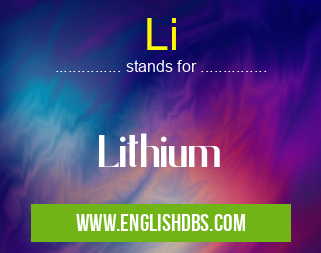What does LI mean in ACADEMIC & SCIENCE
Li is a chemical element with the atomic number 3. It is a soft, silvery-white metal that is the lightest of all metals. Li is highly reactive and flammable, and it must be stored under oil to prevent it from reacting with air.

Li meaning in Academic & Science in Academic & Science
Li mostly used in an acronym Academic & Science in Category Academic & Science that means Lithium
Shorthand: Li,
Full Form: Lithium
For more information of "Lithium", see the section below.
Occurrence
Li is a relatively rare element, accounting for only about 0.002% of the Earth's crust. It is found in a variety of minerals, including spodumene, petalite, and lepidolite. Li is also found in seawater, but it is present in very low concentrations.
Uses
Li has a wide variety of applications, including:
- Batteries: Li is used in the cathode of lithium-ion batteries, which are found in a variety of electronic devices, such as laptops, cell phones, and electric vehicles.
- Glass and ceramics: Li is used to make lightweight and durable glass and ceramics.
- Pharmaceuticals: Li is used to treat bipolar disorder.
- Lubricants: Li is used in high-temperature lubricants.
Health Effects
Li is a toxic substance, and it can cause a variety of health effects, including:
- Skin irritation: Li can cause skin irritation and burns.
- Eye irritation: Li can cause eye irritation and damage.
- Respiratory irritation: Li can cause respiratory irritation and damage.
- Nervous system damage: Li can damage the nervous system, leading to a variety of symptoms, such as tremors, muscle weakness, and paralysis.
Essential Questions and Answers on Lithium in "SCIENCE»SCIENCE"
What is Lithium (Li)?
Lithium is the lightest metal and the third element on the periodic table. It is a soft, silvery-white metal that is highly reactive and flammable. Lithium is found in nature as a salt in minerals such as spodumene and petalite.
What are the properties of Lithium?
Lithium has a low density (0.534 g/cm³), a low melting point (180.5 °C), and a low boiling point (1342 °C). It is a good conductor of electricity and heat. Lithium is highly reactive and can react with water, oxygen, and other elements.
What are the uses of Lithium?
Lithium is used in a variety of applications, including:
- Batteries: Lithium-ion batteries are used in a wide range of electronic devices, including laptops, cell phones, and electric vehicles.
- Glass and ceramics: Lithium is added to glass and ceramics to improve their strength and durability.
- Pharmaceuticals: Lithium is used as a medication to treat bipolar disorder.
- Aerospace: Lithium is used in rocket propellants and other aerospace applications.
Is Lithium safe?
Lithium is a reactive metal, and it can be hazardous if not handled properly. Lithium metal can react with water and oxygen to form flammable compounds. Lithium-ion batteries can also be hazardous if they are mishandled or overcharged. However, when lithium is used in commercial products, it is typically in a safe form that does not pose a risk to consumers.
Final Words: Li is a versatile element with a wide variety of applications. However, it is also a toxic substance, and it must be handled with care to avoid health risks.
Li also stands for: |
|
| All stands for LI |
